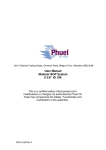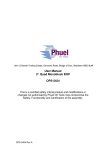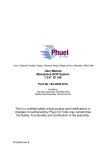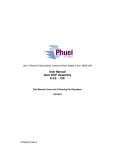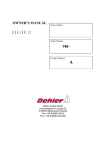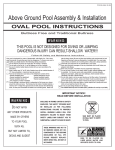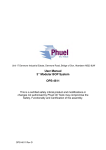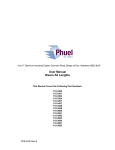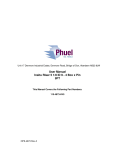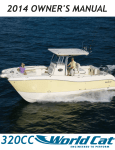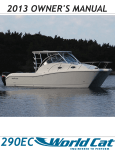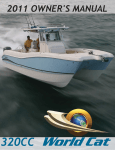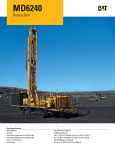Download User Manual Modular BOP System
Transcript
Unit 12 Barratt Trading Estate, Denmore Road, Bridge of Don, Aberdeen AB23 8JW User Manual Modular BOP System This Manual Covers the Following Part Numbers: 193-3568-HV0 This is a certified safety critical product and modifications or changes not authorised by Phuel Oil Tools may compromise the Safety, Functionality and Certification of the assembly. OPS-3568-Rev F User Manual Modular BOP System Table of Contents Revision History .......................................................................................... iv Safety............................................................................................................... v 1 Introduction ............................................................................................... 1 1.1 General .............................................................................................. 1 1.2 Product Identification ......................................................................... 2 1.3 Modular Traceability Map .................................................................. 2 2 Technical Specification ............................................................................. 4 3 Technical Description ............................................................................... 6 3.1 Basic Description ............................................................................... 6 4 Basic Operation ........................................................................................ 7 4.1 Operating the Rams........................................................................... 7 4.1.1 Hydraulic Operation .................................................................... 7 4.1.2 Manual Operation ....................................................................... 7 4.1.3 Locking the Rams ....................................................................... 7 4.1.4 Proper Use ................................................................................. 8 4.2 Equalising across the rams................................................................ 8 4.3 Job Planning .................................................................................... 13 4.3.1 Before the Job .......................................................................... 13 4.3.2 During the Job .......................................................................... 13 4.3.3 After the Job ............................................................................. 13 5 Operational Characteristics..................................................................... 15 5.1 Sealing Characteristics .................................................................... 15 5.1.1 Minimum Hydraulic Pressure .................................................... 15 5.1.2 Opening the BOP with differential pressure .............................. 15 5.2 Fatigue Testing ................................................................................ 15 5.3 Ram Access Testing ........................................................................ 16 5.4 Shearing Performance and limitations ............................................. 16 5.5 Performance of Ram Guides ........................................................... 16 5.6 Temperature and Pressure Limitations ............................................ 17 5.6.1 General Sealing ........................................................................ 17 5.6.2 Blind Ram Shear Seals ............................................................ 17 5.6.3 Wireline Multi-Seals .................................................................. 17 6 Maintenance ........................................................................................... 19 6.1 Introduction ...................................................................................... 19 6.2 Schedule.......................................................................................... 19 6.2.1 Pre & Post Job.......................................................................... 19 6.2.2 Yearly ....................................................................................... 19 6.2.3 Five Yearly ............................................................................... 19 6.3 Safety .............................................................................................. 19 6.4 Tools ................................................................................................ 20 6.5 Ram Seal Redress........................................................................... 20 6.5.1 Access Rams............................................................................ 20 6.5.2 Ram Removal (not required to redress ram seals) ................... 21 6.5.3 Ram Seal Redress ................................................................... 21 OPS-3568-Rev F i User Manual Modular BOP System Re-attach to BOP Body ............................................................ 22 6.5.4 6.6 Modular Connection......................................................................... 23 6.6.1 Splitting the Connection............................................................ 23 6.6.2 Re-Making the Connection ....................................................... 23 6.7 Optional metal to metal seal ............................................................ 25 6.7.1 Procedure for fitting metal to metal seal in 6-3/8 Modular BOP 26 6.8 Maintenance Record Sheet ............................................................. 34 7 Testing .................................................................................................... 35 7.1 Prepare BOP for pressure testing .................................................... 35 7.2 Body Test ........................................................................................ 35 7.3 Ram test: Shear seal ....................................................................... 36 7.4 Wireline Ram Seal Test (Between the ram)..................................... 36 7.5 Post Test Procedure ........................................................................ 37 8 Parts List and Drawings .......................................................................... 38 9 Spares .................................................................................................... 54 Table 1: Technical Data ................................................................................... 4 Table 2: Minimum hydraulic pressure to seal ................................................. 15 Table 3: Shearing performance and limitations .............................................. 16 Table 4:Maintenance Record ......................................................................... 34 Table 5: 193-3568-HV0 Parts List .................................................................. 38 Table 6: Modular Body Parts List 196-3145-HV0 ........................................... 41 Table 7: Modular Actuator Assembly 190-2476-HV0 ..................................... 43 Table 8: Wireline Ram Assy 190-3863-HH0 .................................................. 45 Table 9: Shear Ram Assy 190-3862-HH0 ...................................................... 46 Table 10: Parts List Bottom Sub .................................................................... 47 Table 11: Parts List Top Sub.......................................................................... 48 Table 12: Equalisation Assy 190-2806-HV0 .................................................. 49 Table 13: Bolted Collar Parts List 196-3497-HS0 .......................................... 50 Table 14: Bolted Collar Parts List 196-3150-HS0 .......................................... 51 Table 15: Triple Injection Module 6.5K Parts List 193-4023-HV1 .................. 52 Table 16: Modular BOP Hydraulic Fittings 193-3591-HS0 ............................. 52 Table 17: BOP Redress Kit RDK-3568-HV0 .................................................. 54 Table 18: Modular Body Redress Kit RDK-3145-HV0.................................... 54 Table 19: Redress Kit HV0-3318-HV0 ........................................................... 54 Table 20: Actuator Redress Kit RDK-2476-HH0 ............................................ 54 Table 21: Wireline Ram Redress Kit RDK-2777-HH0 .................................... 54 Table 22: Shear Ram Redress Kit RDK-2805-HH0 ....................................... 55 Table 23: Equalisation/Isolation Redress Kit RDK-2806-HV0 ........................ 55 Table 24: Triple Injection Redress Kit RDK-4023-HV0 .................................. 55 Table 25: Modular Body Redress Kit RDK-2476-HV0.................................... 55 Table 26: 9-1/2” Bottom Sub Redress Kit RDK-3156-HV0 ............................. 55 Table 27: 11-1/2” Bottom Sub Redress Kit RDK-3152-HV0 ........................... 55 Table 35: Optional Metal to Metal Seal .......................................................... 55 Figure 1: Typical identification tag.................................................................... 2 OPS-3568-Rev F ii User Manual Modular BOP System Figure 2: Modular Map ..................................................................................... 3 Figure 3: BOP Dimensions .............................................................................. 5 Figure 4: Section through BOP rams (closed position) .................................... 6 Figure 5: Equalisation Layout........................................................................... 9 Figure 6: Equalisation Operation 1................................................................. 10 Figure 7: Equalisation Operation 2................................................................. 11 Figure 8: Equalisation Operation 3................................................................. 12 Figure 9: Correct lubrication for storage ......................................................... 14 Figure 10: Qualified Operating Envelope ....................................................... 18 Figure 11: Accessing the rams....................................................................... 21 Figure 12: BOP Wireline Rams ...................................................................... 21 Figure 13: BOP Shear Rams ......................................................................... 22 Figure 14: Example of Two bolted collar and lock block ................................ 24 Figure 15: Example of Single bolted collar and lock block ............................. 24 Figure 16: Assembling the Modules (Part 1) .................................................. 27 Figure 17: Assembling the Modules (Part 2) .................................................. 28 Figure 18: Assembly of the Equalising Block ................................................. 29 Figure 19: Assembly of the Frame ................................................................. 30 Figure 20: Modular Body Assembly ............................................................... 31 Figure 21: Actuator (Part 1)............................................................................ 32 Figure 22: Actuator (Part 2)............................................................................ 33 Figure 23: Modular BOP 193-3568-HV0 (Part 1) ........................................... 39 Figure 24: Modular BOP 193-3568-HV0 (Part 2) ........................................... 40 Figure 25: Modular Body 196-3145-HV0 ....................................................... 42 Figure 26: Modular Actuator 190-2476-HV0 .................................................. 44 Figure 27: Wireline Ram Assy 190-3863-HH0 ............................................... 45 Figure 28: Shear Ram Assy 190-3862-HH0 .................................................. 46 Figure 29: Bottom Sub Assembly................................................................... 47 Figure 30: Top Sub Assembly ........................................................................ 48 Figure 31: Equalisation Assy 190-2806-HV0 ................................................. 49 Figure 32: Bolted Collar Assembly (Single Bolt) 196-3497-HS0 .................... 50 Figure 33: Bolted Collar Assembly (Dual Bolt) 196-3150-HS0 ....................... 51 Figure 34: Equalizing Check Valve Assy 193-4023-HV0 ............................... 53 OPS-3568-Rev F iii User Manual Modular BOP System Revision History Issue, Release Date Rev A, 11 Jan 10 Rev B, 10 May 11 Rev C, 24 May 11 Rev D, 23 Mar. 12 Rev E, 11 Apr. 12 Rev F, 17 Jan 13 OPS-3568-Rev F Description Initial Issue Update after NORSOK Qualification Spares Part No Correction for Inner Seals Addition of Redress Kit RDK-3318HV0 Torque Value added for ¾ Hex Nuts (HNC-0670-STL) Updated with improved seals per FB029. Added improved shear blades. Added details of metal to metal seal. iv User Manual Modular BOP System Safety WARNING: Trapped air requires considerable time to compress and when it is compressed is highly dangerous. It has enough stored energy to separate parts with considerable force. This product contains high pressures, when in operation. Failure of any part may cause injury. Welding, corrosion, rough handling, or other abuse may affect the Integrity of this product. All pressure equipment has a particular pressure rating and care must be taken to ensure that no item is used in a situation that may cause its working pressure to be exceeded. All personnel involved in pressure testing must be formally trained, competent and utilise the appropriate PPE. Ensure the identification plate is fitted and is displaying the correct information This equipment and the equipment it is attached to is heavy never position yourself below a suspended load The Actuator piston has two seal with a vent hole to prevent communication of well pressure to the hydraulic chambers (on opposite side of grease nipple). This vent hole must never be blanked off. OPS-3568-Rev F v User Manual Modular BOP System 1 Introduction 1.1 General The Modular Blow Out Preventer (BOP) provides essential safety barriers against well pressure during wireline operations. It is usually located directly above the christmas tree flange. The BOP (Depending on configuration) can have one or more sets of wireline rams for sealing against well pressure on slick line and/or braided line. Shear and seal rams are also available these are capable of cutting through the wire and then sealing against the well pressure. The modular concept allows the operator to configure the BOP as required to suit even special operations. The main advantage comes when maintaining the equipment as ram bodies can be easily changed out with spares more cost effectively allowing the asset use to be maximised. The ram consists of a hydraulic piston that can be extended or retracted to energise or retract the ram. The ram has a set of inner and horse shoe outer seals that when compressed against the opposite ram forms a continuous seal that is further energised by the application of pressure in one direction. The ram consequently can be arranged so that it holds pressure from below the BOP or from above. Across the rams there is an equalisation valve assembly. This is used to equalise pressure across the rams so that the rams can be withdrawn to open up the well bore. The equalisation valve assembly consists of a cone seal set on a screw. Unwinding the screw opens the valve and allows equalisation across the rams. Tightening the screw closes the seal and prevents pressure from passing through the valve assembly. There is also a circuit to allow the injection of chemicals into the well or across the equalisation valves, and can be used to prevent the valves freezing while bleeding down gas (by injecting glycol for example). The injection port has a check valve to prevent well pressure entering the injection system. Between upper and middle ram, it is possible to inject grease through the injection port located at the rear of the BOP. For braided line operations or in cases where an effective seal cannot be achieved, the injection port can be used to inject grease at pressures greater than the well head pressure, limited to the maximum working pressure of the BOP. The injection port has a check valve to prevent well pressure entering the injection system. The BOP is mounted to a crash frame assembly that provides forklift pockets protection during transport. The crash frame has foldable platforms for the operators to stand on when operating the BOP and stabbing in the lubricator. This user manual serves as an introduction to the equipment and contains the relevant specifications, operation, planning and maintenance instructions, parts list and drawings. OPS-3568-Rev F 1 User Manual Modular BOP System 1.2 Product Identification Phuel products are identified by a unique serial number that facilitates full product traceability. Each product is supplied with a documentation pack that contains product certification and material/inspection reports. The serial number is always etched on the surface of the product but can sometimes be difficult to find or read after painting. A customer identification number is also included to allow the customer to track the asset in their system. A stainless steel band secures the nameplate tag that is stamped with the information shown below. This tag should be located in the first instance to ensure that this manual refers to the correct equipment. Figure 1: Typical identification tag 1.3 Modular Traceability Map The modular BOP consists of individually certified assembles that are used to form an overall BOP. The standard configuration is a triple BOP (this manual) but the modular design allows the BOP to be reconfigured to a single or dual BOP by removal of one or more of the individual assemblies or for individual modules to be replaced due to wear or damage. It is essential that the documentation is maintained for each module in the assembly so that the traceability records reflect the modules that have been assembled. The modular traceability map is intended to assist the user in recording the important trace information and also ensuring that certified components remain with the relevant assemblies. The parts list section of this manual should be used to determine how assemblies and components are grouped together. It is recommended that the manufacturing documentation supplied with the BOP is reviewed before splitting the BOP to ensure that the assemblies can be put back together correctly with the traceability intact. OPS-3568-Rev F 2 User Manual Modular BOP System Record the numbers for each of the modules and ensure that it matches on the corresponding product certificate Top Level (Tag) RAMS Top Level (Stamped) SHEAR Figure 2: Modular Map OPS-3568-Rev F 3 User Manual Triple BOP System 2 Technical Specification Part Number Top Connection Bottom Connection Height Width Working Pressure Test Pressure Service Hydraulic Pressure Stroke Volume (Standard Act) Stroke Volume (Shear Act) Weight Hydraulic Connections 193-3658-HV0 9.5-4 ACME Quick Union Box 9.5-4 ACME Quick Union Pin/ Collar 79.5”/ 2.02 m 75.2”/1.91 m 6,500 PSI (448 Bar) 10,000 PSI (690 Bar) H2S 3,000 psi (200 Bar) Max (Standard Actuators) 52 cu-in to close – 48 cu-in to open – Total =107 cu-in (1.64 litres) 52 cu-in to close – 48 cu-in to open – Total =107 cu-in (1.64 litres) 4880 lbs / 2214 kg Wireline Rams - 3/8” Phoenix Beattie HP Quick Release Coupling (QR74 Range) Shear Rams – 3/8” Phoenix Beattie HP Quick Release Coupling (QR74 Range) Actuators – ¼” NPT x 3/8” Tube Grease Injection – 3/8” Phoenix Beattie HP Quick Release Coupling (QR74 Range) Chemical Injection Port – 3/8” Phoenix Beattie HP Quick Release Coupling (QR74 Range) Gauge Port – ½” NPT (10,000 psi max WP) Table 1: Technical Data OPS-3568-Rev F 4 User Manual Triple BOP System Figure 3: BOP Dimensions OPS-3568-Rev F 5 User Manual Modular BOP System 3 Technical Description 3.1 Basic Description The Phuel BOP provides a positive barrier against well pressure while performing intervention operations. The equipment consists of three sets of hydraulically operated rams that can be individually pumped closed to form a seal against pressure. The orientation of the ram outer seal determines whether the rams hold pressure from above or below. By opposing adjacent ram sets it is possible to apply pressure between the rams through a grease injection port, normally at a pressure greater than the well pressure, and thus form a positive protection barrier. This technique is particularly effective when sealing against braided wire-line as a leak tight seal cannot be obtained due to the construction of the wire. The high viscosity of the grease allows the pressure to be maintained even though a small leak (of grease) still exists. Outer Seal Indicator Rod Ram Piston Pressure Inner Seal Figure 4: Section through BOP rams (closed position) The rams are driven by a hydraulic actuator, which consists of a piston with an indicator rod to provide visual confirmation of the position of the rams. A manual locking mechanism is also provided to ensure that when the BOP is closed hydraulically during operations it cannot be opened again until the mechanism is deliberately withdrawn. Each of the actuators assemblies are identical on the Phuel BOP and so can be positioned in any ram bore. This provides excellent flexibility for maintenance and redress of the equipment. OPS-3568-Rev F 6 User Manual Modular BOP System 4 Basic Operation 4.1 Operating the Rams Note – Always ensure that the pressure across the rams has been equalised before opening. 4.1.1 Hydraulic Operation The BOP has been provided with flexible armoured piping to offer the required fire protection level. Two connections are required for each ram set for open and close. It is important that both connections are connected, as the fluid displaced by the movement of the piston must be allowed to pass through the valve system back to the reservoir. A Well Control Unit (WCU) is normally used to operate the BOP in an offshore environment. Refer to the relevant manual for that equipment for details of operation and connection. An alternative pump pack may be used for onshore maintenance work but the operation of this equipment is out with the scope of this manual. 4.1.2 Manual Operation The rams can be closed manually (but not opened again) by turning the hand wheel in a clockwise direction some 30-40 turns providing that the hydraulic fluid from the other side (open port) is allowed to escape. The hydraulic connections must still, therefore, be made up to the WCU even when intending to operate the rams manually. Once the rams have been closed using the manual method it is not possible to open them again without hydraulic pressure. The Hand wheel, however, must still be turned in an anti-clockwise direction until it stops to allow the piston to move fully back. 4.1.3 Locking the Rams After closing with hydraulic pressure the piston can be mechanically locked by winding in the manual mechanism. Turning the hand wheel in a clockwise direction will advance the locking mechanism by 3mm per turn. It is therefore necessary to turn the hand wheel 30-40 turns to lock in the piston. Continue to turn until the hand wheel stops, indicating that the piston is now against the back-up lock. For safety reasons and to reduce the mechanical effort required, Phuel recommends that the hydraulic pressure be removed or reduced while closing the mechanical back up. This reduces the risk of injury caused by OPS-3568-Rev F 7 User Manual Modular BOP System the failure of a seal under hydraulic pressure and decreases the time required to implement the back up feature. It is important to remember that the manual lock must be fully withdrawn before the rams can be opened. The mechanism is rated for operation at full working pressure or at full hydraulic pressure but not both at the same time. Strict measures must be taken to ensure that the BOP is not accidentally opened against the back up mechanism when the well pressures are in excess of 4,500 psi. Damage to the mechanism may result and it may not be possible to fully withdraw the rams. There would, however, be no expected loss of pressure containment as a result if this failure. 4.1.4 Proper Use In the event that the BOP is closed against wire during an operation, it is essential that the Inner seals are replaced after that job has been completed. Working practice and procedures must reflect this requirement. Blind shear seals should always be fitted on the shear rams. They should be tested regularly to verify that they are suitable for operation. If they are ever closed during a live well operation they should be replaced when the operation is complete. 4.2 Equalising across the rams Each ram has a dedicated equalising valve block and these blocks are connected together to allow single point chemical injection, pressure measurement and dump facility. There are four valves on each block, two are for equalising and two are for isolation. By opening and closing the appropriate valves it is possible to either equalize the pressure across closed rams, inject chemicals above or below any of the rams or a combination of both. There are two isolated external ports that allow the connection of a pressure gauge and drain hose if required. OPS-3568-Rev F 8 User Manual Modular BOP System Understanding The Layout C GAUGE A 1 B D (WITH CHECK VALVE) 2 GREASE INJECTION CHEMICAL INJECT 3 DUMP (REMOVE PLUG TO USE) Figure 5: Equalisation Layout OPS-3568-Rev F 9 User Manual Modular BOP System Equalizing Across The Rams 1C (OPEN) 1D (OPEN) Pressure Across Rams Equalised Pressure Below Upper Rams ALL VALVES CLOSED UNLESS STATED OTHERWISE Start Chemical Injection 1A (OPEN) 1A (OPEN) 2A (CLOSED) Pressure reaches Isolation Valve 2A 2B (CLOSED) Pressure reaches chemical line & Gauge ALL VALVES CLOSED UNLESS STATED OTHERWISE Figure 6: Equalisation Operation 1 OPS-3568-Rev F 10 User Manual Modular BOP System Using Isolation Valve B 1A (OPEN) 1A (OPEN) 1B (CLOSED) 1B (OPEN) 2A (OPEN) 2B (CLOSED) 2B (OPEN) 3B (CLOSED) 3B (OPEN) Isolation Valve B gives access to the Ram Branch Each Ram Branch can be accessed individually ALL VALVES CLOSED UNLESS STATED OTHERWISE Injection Between Rams 1A (OPEN) 1A (OPEN) 1B (CLOSED) 1B (CLOSED) 2C (CLOSED) 2C (OPEN) 2A (OPEN) 2A (OPEN) 2B (OPEN) 2B (OPEN) 3B (CLOSED) Starting with Isolation Valve 2B open 3B (CLOSED) Opening 2C allows access between the Upper Rams ALL VALVES CLOSED UNLESS STATED OTHERWISE Figure 7: Equalisation Operation 2 OPS-3568-Rev F 11 User Manual Modular BOP System Stop Chemical Injection 1A (OPEN) 1A (OPEN) 1B (CLOSED) 1B & 1C (OPEN) 2A (OPEN) STOP STOP DUMP IF PLUG REMOVED Injection Stopped (WARNING -pressure remains) 3A (OPEN) Pressure can be dumped between rams or externally ALL VALVES CLOSED UNLESS STATED OTHERWISE Equalizing With Chemical Injection 1A (OPEN) 2A (CLOSED) STOP STOP 3C (OPEN) 3B (OPEN) 3D (OPEN) Pressure Below Shear Ram – Injection started Open 2A, 3B, 3D then 3C to prevent freezing ALL VALVES CLOSED UNLESS STATED OTHERWISE Figure 8: Equalisation Operation 3 OPS-3568-Rev F 12 User Manual Modular BOP System 4.3 Job Planning 4.3.1 Before the Job • • • • Check that the certification is within date and that the scheduled maintenance is up to date. All inner seals need to be replaced after 30 pressure cycles. A record of functional testing must be maintained. Examine the BOP Assembly, to make sure that it is good operating order and assembled with the Rams in the correct orientation for the desired operation. Functioning of the Rams may be checked, by running both Rams to the closed position. Do not exceed the maximum operating pressure when closing the Rams. Pressure test the rams from the direction of the well (or applied) pressure that is expected during the operation. This also verifies that the rams are in the correct orientation. 4.3.2 During the Job • • • • • Special care should be taken that the Rams are fully open when passing any equipment through them. The impact of the tool string hitting a Ram may damage the Ram to such an extent that the Ram may no longer Seal, or prevents it from fully opening. Only lift the BOP using suitable lift caps. Do not sling or attach lifting equipment to the crash frame to lift the BOP assembly. Care should be taken to completely remove any residual pressure or accumulated pressure existing on Lubricator equipment above the BOP, before disconnecting the Lubricator. Hydraulic Hose ends should never be allowed to drop in to dirt or grit, or otherwise become contaminated with foreign matter. If end connections become dirty, they should be cleaned thoroughly with solvent and dried. Only clean Hydraulic fluid should be used (Shell Tellus 22 is recommended) to operate the BOP. The use of mixed types, dirty, or very old fluid of unknown origin is not recommended. When one of these conditions is known or suspected, the hydraulic system should be flushed and the hydraulic fluid replaced. 4.3.3 After the Job After each job, the BOP should be thoroughly cleaned, repaired as may be required and redressed. The BOP should be protected against the effects of corrosion to ensure that the expected functionality is achieved. The diagram overleaf highlights the key areas to consider. OPS-3568-Rev F 13 User Manual Modular BOP System Grease seal bore & threads before fitting thread protectors Cover the assembly when in long term storage Smear grease on all bars Pump grease to all grease nipples until it flows through to the other port – Never block the opposite port Touch up the paint when it is damaged Or coat damaged area with thick grease Grease before fitting protectors Fit to test stump and fill with oil for long term storage Figure 9: Correct lubrication for storage OPS-3568-Rev F 14 User Manual Modular BOP System 5 Operational Characteristics 5.1 Sealing Characteristics 5.1.1 Minimum Hydraulic Pressure Testing has confirmed that the BOP requires 1500 psi minimum hydraulic closing pressure to close and seal when there is no initial well bore pressure. The required closing pressure increases as the well bore pressure increases due to the effects of the well pressure acting against the piston rod. The table below should be used a guideline of the minimum closing pressure that can be applied for various well pressure levels. Initial Well Bore Pressure zero to 4,000 psi 4,000-6,000 psi 6,000 to 6.500 psi Min Hydraulic Pressure 1,500 psi 2,000 psi 3,000 psi Table 2: Minimum hydraulic pressure to seal 5.1.2 Opening the BOP with differential pressure It is not recommended that the BOP should be opened with differential pressure across the rams. The pressure should always be equalised first, using the equalising valves. With differential pressures lower than 2,000 psi across the rams it is possible for the well pressure to force the BOP open if the hydraulic closing pressure is removed. This is not the case when the differential pressure across the rams is greater than 2,000 psi. The manual locking feature should therefore be used when the BOP is closed to prevent accidental opening 5.2 Fatigue Testing Testing has been performed to establish the fatigue limit of the actuators and rams so that preventative maintenance can be scheduled to replace worn seals or parts. A total of 546 close/open cycles have been completed without failure including 78 pressure cycles to maximum working pressure. This test simulates closing and opening the BOP once per day and testing well bore pressure at 300 psi and 10,000 psi once per week for 1.5 years of service. Records must be maintained to ensure that the seals are replaced before this limit is exceeded. If records do not exist then the seals should be changed every year as a minimum. OPS-3568-Rev F 15 User Manual Modular BOP System 5.3 Ram Access Testing Testing has been performed to determine the ability of the BOP to undergo repeated ram changes without affecting operating characteristics. The tests have shown that the rams were accessed a total of 200 times (test limit) without failure of the sealing or locking mechanism. Records must be maintained to ensure that the seals are replaced before this limit is exceeded. If records do not exist then the seals should be changed every year as a minimum. 5.4 Shearing Performance and limitations Testing has been conducted to verify the shearing and sealing capabilities of the shear rams. The table below shows the results of these tests. Wire Size (dia) No of wires Wire Type Slick line Hydraulic Pressure needed to shear at zero bore pressure 400psi Maximum Wellbore Pressure (psi) 6,500 psi 0.125” 1 0.125” 0.160” 6 Slick line 800 psi 6,500 psi 1 Slick line 400 psi 6,500 psi 7/32” 1 Braided 500 psi 6,500 psi 7/32” 2 Braided 1300 psi 6,500 psi 9/32” 1 Braided 750 psi 6,500 psi 5/16” 1 Braided 700 psi 6,500 psi 7/16” 1 Braided 1400 psi 6,500 psi 15/32” 1 Braided 1500 psi 6,500 psi Table 3: Shearing performance and limitations Note – The shear blades are designed to cut only once. The blades must always be replaced once they are used to cut wire. 5.5 Performance of Ram Guides Testing has been conducted to verify that the wireline rams can centralise the cable without cutting – at extreme wire positions and with applied side loadings. The rams always closed without incident or damage to the cable. Operational planning and set up should still attempt to minimise the expected side loading on the wire by ensuring the lubricators are vertical and that the tool string is centralized as much as possible in the well bore. OPS-3568-Rev F 16 User Manual Modular BOP System 5.6 Temperature and Pressure Limitations Testing has been conducted to verify the performance of the BOP at extreme operating temperatures. 5.6.1 General Sealing The BOP seals (typically of 90 hard Viton material with part numbers listed in this manual) have been qualified for operating temperatures between -10C and 121C with no restrictions to the operating pressure. 5.6.2 Blind Ram Shear Seals Bind inner seals part number 190-3921-H80 have been superseded with part number 190-5306-H80 which offer improved sealing at higher temperature. The shear rams have been qualified for operation between -10C and 121C with no restrictions to the working pressure. 5.6.3 Wireline Multi-Seals The wireline multi-seal part number 190-3689-H90 has been superseded with part number 190-5307-H80 which incorporates Phuel’s anti-extrusion pad which improves the sealing capability at higher temperature, as show in the operating envelope below. If operations dictate that the expected surface temperatures and pressures exceed the operating envelope then wire specific inner seals must be used instead of the standard multi-seal. It should be noted that the point (82C, 690 bar) has been qualified on the basis of extrapolated test results and not directly confirmed by testing. API 16A does not require qualification below 82C. Care should be taken when operating close to this point and further qualification testing may be required to confirm suitability. Consult Phuel Oil Tools for advice and part numbers. OPS-3568-Rev F 17 User Manual Modular BOP System Figure 10: Qualified Operating Envelope OPS-3568-Rev F 18 User Manual Modular BOP System 6 Maintenance All maintenance to be carried out by suitably qualified and competent personnel 6.1 Introduction Regular maintenance of the equipment using Phuel redress kits or approved spares is essential to its continued safe operation. Ensure that the pre and post job operating procedures are followed and that maintenance records are kept. 6.2 Schedule The maintenance schedule may be governed by international or company standards and the following is considered to be the minimum requirements. 6.2.1 Pre & Post Job Refer to Section 4.3.1 and Section 4.3.3 for details. 6.2.2 Yearly • Disassemble BOP • Clean and degrease all components. • Discard screws from ram plate and replace with new ones • Remove rust using a non toxic rust remover gel or liquid. • Inspect the condition of sealing surfaces and surface coatings, repair/replace as necessary. • Re-coat threads and sealing surfaces if necessary. Contact Phuel if in doubt. Apply protective coating like Boeshield T-9 to non painted surfaces • Replace all elastomeric seals. • Re-assemble BOP. • Pressure Test to 300 psi and to maximum working pressure. • Inspect paintwork and repair where necessary. 6.2.3 Five Yearly • Yearly maintenance, plus the following. • Carry out surface NDE on all component threads and damaged surfaces. • Pressure Test to 300 psi and maximum test pressure per API 6A – PSL3 (Witnessed by certifying authority). 6.3 • Safety This product contains high pressures, when in operation. Failure of any part may cause injury. Welding, corrosion, rough handling, or other abuse may affect the Integrity of this product. OPS-3568-Rev F 19 User Manual Modular BOP System • • • • Many of the components are heavy and should not be lifted without lifting aids. Wear appropriate personal protective equipment. Do not over exert yourself while using torque wrenches. Use appropriate mechanical advantages when available. Ensure that all tools and equipment are in good condition and are suitable for intended use. 6.4 Tools The following tools are recommended. • Non marking Memac Chain Wrench. Other pipe wrenches may be used but will mark equipment. • Piston Seal Sub Assembly Tool (Part No. 900-1577-400). • Allen Key’s (7/32, 5/16” & 3/8” long version for removing Actuators from the BOP). • External Circlip Pliers. • ¼”-20 UNC Socket Head Cap Screw x 1” Long. • Pair of Long Nose Pliers. • Large Flat ended Screwdriver. • Hide or Rubber Mallet. • Seal Grease • Oil spillage-cleaning kits. • 5K Hydraulic pump and Gauge to operate Actuators. • Lifting equipment/Aids, as required. 6.5 Ram Seal Redress Note: If rams are required to be removed ensure they have been pumped forward until only 2” of the indicator rod is visible 6.5.1 Access Rams This procedure results in the removal of the actuator assembly from the BOP body in order to gain access to the rams. • Ensure Rams are fully opened. • Back off the Actuator from the BOP using the extended 3/8” Allen Key in the Cap Screw heads on the Locking Sleeve. Do not loosen the cap screws during this process. • Once the thread is fully disengaged, pull the Actuator fully back to the End Stops. OPS-3568-Rev F 20 User Manual Modular BOP System Figure 11: Accessing the rams 6.5.2 Ram Removal (not required to redress ram seals) • Remove Ram from Actuator, by sliding the Ram off the Ram Tee. 6.5.3 Ram Seal Redress • The Inner Ram Seals can be removed by simply sliding the seal out to either side • The Outer Seal can be removed by levering out one end with a suitable instrument and simply pulling off. • The Ram is now completely stripped down. Clean and inspect all parts for evidence of damage or excessive wear. Check the seals and replace if required. Repair or replace any damaged or worn parts. If the seals are to be redressed use the parts from the specified redress kit. • Assemble Outer Seals by pushing the tab into the slot in the ram and working it around the radius of the ram. Tap home using a rubber or hide mallet and if required use a screwdriver to lever the second tab over the edge of the slot. Take care not to damage the Seal during assembly but expect that some slithers of rubber will be produced as the corners of the rubber seals are removed by the assembly operation. Tap all around the circumference of the seal to ensure that it is bedded into the groove and that the seal is not protruding above the ram diameter. • Slide the Inner Seals into Ram taking care not to dislodge the outer seal in the process. Figure 12: BOP Wireline Rams OPS-3568-Rev F 21 User Manual Modular BOP System Figure 13: BOP Shear Rams 6.5.4 Re-attach to BOP Body • If the rams were removed from the actuator (Section 6.5.2) then slide the ram back onto the Tee taking careful note of the orientation of the rams depending on its intended use for the BOP assembly. (i.e. if pressure is to be held from below then the outer seal must be on top – otherwise it must be on the bottom). Attach a hydraulic pump to the open port of the actuator and pump the rams back into the recess in the actuator ensuring that the ram does not hang up on the actuator front face. When fully back remove the hydraulic pump. Note - It is still possible to assemble the actuator to the BOP without pumping back the rams but more effort may be required to allow the thread to make up. • • • Apply a generous coating of grease to the inner and outer seals. Push the Actuator back into BOP Body taking care that the edges of the guide pass into the seal bore and make-up the thread using a 3/8” hex key in the cap head screws to provide the torque. Making up the thread will drive the actuator assembly fully home. The Ram Assembly is now fully made up. Repeat this procedure for each ram seal that need to be replaced. OPS-3568-Rev F 22 User Manual Modular BOP System 6.6 Modular Connection The Modular BOP allows modules to be separated and re-configured to suit operation needs. Follow this procedure to split and re-make the modules as required. Note – This must be carried out in a workshop environment with pressure testing facilities by suitably qualified personnel 6.6.1 Splitting the Connection • • • • • • Locate and remove lock block (equalisation blocks may need to be removed to allow access) Remove the bolts that hold the Collar together. There are two design options – one with two bolts on each half and one with a single bolt. Split the Bolted collar using a cold chisel if required. The two halves of the collar must be kept together and never mixed with those from another assembly The two assemblies can now be pulled apart Inspect the T-Seal and replace if necessary Inspect the Pins to make sure they are not damaged. Replace if necessary 6.6.2 Re-Making the Connection Note - Take note of new body serial number to allow update of traceability • • • • • • Ensure that the Pins and T-Seals are in good condition Lower the upper module down to locate the pins in the holes then push down to engage the seal. Drive down with a weight or blows with a soft face hammer if required. The end faces should be almost flush within 1mm. The butress threads of the bolted collar must be degreased before assembly and must never be coated with grease or lubricant. This would increase the radial loading on the retaining bolts and could lead to failure during operation. Fit Bolted collars ensuring that the gap between the two halves is completely closed – rotate the collar (tighten) until it bottoms out then back it off to line up the holes for the Lock Block. Fit lock block to hold collar in place Assemble bolts and washers. Bolts should be cleaned and lubricated with thread compound tested in accordance with ISO 13678. Two Bolts – Torque to 155Nm large bolt and 80Nm small bolt Single Bolt – Torque to 270Nm OPS-3568-Rev F 23 User Manual Modular BOP System • • Carry out pressure testing to maximum working pressure see Test Procedure below Update paperwork with new numbers for traceability Always degrease and Never lubricate the internal threads Lubricate the bolts and torque To specified level Figure 14: Example of Two bolted collar and lock block Figure 15: Example of Single bolted collar and lock block OPS-3568-Rev F 24 User Manual Modular BOP System 6.7 Optional metal to metal seal This seal fits between any of the main body and bottom/top sub modules and is backed up by the elastomeric seal. The seal comes as standard on flanged bottom subs only. The seal crushes during installation and is therefore a single fit seal, so once fitted the connection should not be disturbed. If the connection is broken the metal to metal seal should be replaced. Note: This requires an alternative collar locking mechanism (where fitted), contact Phuel Oil Tools for further details. OPS-3568-Rev F 25 User Manual Modular BOP System 6.7.1 Procedure for fitting metal to metal seal in 6-3/8 Modular BOP Pin Polish seal groove and mating surface Lower the BOP down & locate the pin in the with fine emery – both should be smooth groove then push down to engage the seal. Drive to the finger touch. down with a weight or blows with a soft face Fit the metal seal into the groove hammer if required. The end faces should be almost flush within 1mm Assemble the bolted collar as detailed in section 6.6.2 196-5819-H80 Tighten the locking collar fully. Top of Lock block (were fitted) to be fitted with collar to underside of BOP body should Mushroom Plug. Push the lock block up to the be no more than 0.135”. Additional load collar and fit the two socket head screws. may need to be applied to achieve this gap. OPS-3568-Rev F 26 User Manual Triple BOP System Figure 16: Assembling the Modules (Part 1) OPS-3568-Rev F 27 User Manual Triple BOP System Figure 17: Assembling the Modules (Part 2) OPS-3568-Rev F 28 User Manual Triple BOP System Figure 18: Assembly of the Equalising Block OPS-3568-Rev F 29 User Manual Triple BOP System Figure 19: Assembly of the Frame OPS-3568-Rev F 30 User Manual Triple BOP System Figure 20: Modular Body Assembly OPS-3568-Rev F 31 User Manual Triple BOP System Figure 21: Actuator (Part 1) OPS-3568-Rev F 32 User Manual Triple BOP System Figure 22: Actuator (Part 2) OPS-3568-Rev F 33 User Manual Triple BOP System 6.8 Maintenance Record Sheet Type of Performed Date Performed Maintenance By Verified By Comments Table 4:Maintenance Record OPS-3568-Rev F 34 User Manual Triple BOP System 7 Testing All testing is to be carried out in the designated test area and by suitably qualified and competent personnel. WARNING: Trapped air requires considerable time to compress and when it is compressed is highly dangerous. It has enough stored energy to separate parts with considerable force. 7.1 Prepare BOP for pressure testing • • • • • • • • • • • Check the pressure rating for all test equipment is sufficient to allow testing to be carried out. Check / replace o-ring on the pin part of the BOP. Ensure BOP is placed in an area suitable for pressure testing. Fit the BOP to the test stump. Makeup BOP (collar) on test stump by turning the "collar" all the way down, and then back off ¼ turn Fill BOP with test fluid. Connect the hydraulic hoses from the BCU to BOP to operate the rams. Check all connections / hoses that they are secured with safety wire before use Vent BOP Rams by hydraulic operation of the Rams. On completion of venting the Rams fit test cap, ensuring the valve is in the open position to allow air to vent and top up the BOP with Test Fluid. Once all air is expelled close valve. The BOP is now prepared for testing 7.2 Body Test • • • • • • • • • Ensure that all the rams are in the open position Close equalizing valve 1A, all other equalizing valves to be open. Disconnect pipe on the grease injection and the chemical injection connector plate to test check valves. Fit the pressure test hose with security link Put up safety barrier in the workshop. Pump slowly up to 300 psi and observe for leaks. Hold Time 5 min Bleed the pressure to zero Pressurize to MWP of BOP and observe for leaks. Hold Time 15 min Bleed of pressure to zero and drain BOP. OPS-3568-Rev F 35 User Manual Triple BOP System 7.3 Ram test: Shear seal • • • • • • • • • • • With BOP Rams in the open position and fill up the bop with the test medium by using the test pump. Ensure valve on test cap remains open for the duration of this test. Close Shear Ram, this is done by activating the BCU Shear seal valve to "close" position, then pressurize up to a maximum of 2700 psi on the ram – Test fluid will be observed coming out of the Test Cap valve. Close equalizing valves. (Note - equalizing valve setup to be added to the test chart with number and position) Connect pressure test pump to the Test Stump so that pressure testing is done from the underside of rams and up Observe Test Cap valve during testing for fluid leaking out under pressure. Put up safety barrier in the workshop. Pressurize up to 300 psi low pressure test - observe if there are leaks. Hold Time 5 min Bleed the pressure to zero Press up to the MWP for the bop in accordance documentation - keep pressure in 15 min. Bleed the pressure to zero. Open rams on bop by enabling BCU Shear seal valve to "open" position. 7.4 Wireline Ram Seal Test (Between the ram) • • • • • • • • • • Ensure Test Cap is not fitted Ensure all Rams are in open position Open the equalizer valve between the respective rams to be tested. Connect the test hose in the 1A on equalizing block (gauge port) Close the Middle Ram. Open Snaptite connector on the test stump for verification of leakage on the lower ram. Fill the BOP with test fluid to above the Upper Ram. Close the Upper Ram by setting Ram to 2700 psi by activating the valves on the BCU to "close position. Pump test medium thru the equalizing. Block 1C to see fluid is rising above the upper ram. Close equalizing valve 1C, 2A, 2D, 3A, 3B. Open equalizing valve : 1A, 1B, 1D OPS-3568-Rev F 36 User Manual Triple BOP System • • • • • • Put up safety barrier in the workshop. Pressure up to 300 psi in 5 minutes and observe for leaks Bleed off to zero Press up to MWP for bop according to documentation for current bop for 15 min Bleed pressure to zero. Open the rams- open lower first, and then the upper ram. 7.5 Post Test Procedure • • • • • Disconnect All Hoses Remove Test Cap Drain out test fluid and circulate with water displacing fluid or lubricating oil Remove BOP from Test Stump Grease end connections and fit oiled thread protectors OPS-3568-Rev F 37 User Manual Triple BOP System 8 Parts List and Drawings Item Number 1 2 3 4 5 6 Part Number Quantity 196-3145-HV0 3 196-3497-HS0 4 196-3493-HV0 1 196-3492-HV0 1 190-3863-HH0 2 190-3862-HH0 1 7 193-4024-SS0 1 8 9 193-4023-HV1 193-3591-HS0 1 1 Description 6-3/8 MULTILINE BODY ASSY CONNECTING COLLAR ASSY TOP SUB 9.5-4 X 1-13/16 SIDE OUTLET BOTTOM SUB 9.5-4 X 2-1/16 SIDE OUTLET 6 3/8 WIRELINE RAM ASSEMBLY V2 6-3/8 SHEAR RAM ASSEMBLY V2 6-3/8" TRIPLE MODULAR CRASH FRAME ASSY (DW STYLE) TRIPLE INJECTION MODULE 6.5k MODULAR BOP HYDRAULIC FITTING LIST Table 5: 193-3568-HV0 Parts List OPS-3568-Rev F 38 User Manual Triple BOP System Figure 23: Modular BOP 193-3568-HV0 (Part 1) OPS-3568-Rev F 39 User Manual Triple BOP System Figure 24: Modular BOP 193-3568-HV0 (Part 2) OPS-3568-Rev F 40 User Manual Modular BOP System Item 1 2 4 6 8 10 11 12 13 14 20 21 22 23 24 Part No 196-3318-480 190-2476-HV0 190-2806-HV0 190-2413-X90 190-1537-316 802-2921-V80 196-2919-316 196-2918-316 950-3168-316 950-3169-316 CSU-0585-3A4 196-3164-304 190-2791-316 190-2804-304 SHC-0507-HTS Qty 1 2 1 4 4 1 2 2 4 4 4 2 1 1 2 Description MODULAR BOP BODY - 10K ACTUATOR ASSEMBLY V2 EQUALISATION BLOCK ASSEMBLY SLIDER ROD 21.5 LONG END STOP 7.642 T-SEAL WITH BACK-UPS BOP HOSE - CLOSE BOP HOSE - OPEN CONNECTOR 3/8 BSPP X 3/8 NPT (1252-06-06) CONNECTOR 1/4 BSPP X 1/4 NPT (1252-04-04S) CSink Soc Hd Size 1/2 Length 1 in DOWEL PIN 6MM X 32MM LONG LOCK BLOCK SPIROL ROLL PIN 1/4 DIA X 1 Soc Hd Cap Size 1/4 Length 1 in Table 6: Modular Body Parts List 196-3145-HV0 OPS-3568-Rev F 41 User Manual Triple BOP System Figure 25: Modular Body 196-3145-HV0 OPS-3568-Rev F 42 User Manual Modular BOP System Item 1 2 3 4 5 6 7 8 9 10 11 12 13 20 21 22 23 30 31 32 33 34 35 36 37 40 41 42 43 44 45 46 47 48 Part Number Quantity 190-2927-480 1 190-2772-480 1 190-1726-480 1 190-1645-316 1 190-1649-480 1 190-1773-STL 1 190-2926-480 1 190-1929-480 1 190-3233-STL 1 190-1612-480 1 190-2863-480 1 190-2838-480 1 190-1774-STL 1 190-1696-STL 1 190-1702-STL 1 190-1704-STL 1 190-1608-STL 2 802-1699-H85 1 802-2505-H85 1 801-0345-V90 1 802-2161-H85 1 801-0344-V90 1 802-2162-H85 1 801-0342-V90 1 801-0439-V90 1 190-2491-STL 1 190-1756-STL 4 SHC-0503-B7M 4 SDU-0582-HTS 3 SHC-0581-HTS 4 WNL-0580-316 5 SDU-0503-HTS 1 100-2179-STL 1 190-3870-H85 1 Description ROTATE CYLINDER CAP DRIVE ROD DRIVE SLEEVE INDICATOR ROD CAP COLLAR DRIVE KEY PLATE (CAST) HOUSING PISTON MODULAR ACTUATOR BRACKET Piston Seal Sub ACTUATOR COLLAR RAM KEY PLATE RAM TEE Thrust Bearing (FAG 812 06) Hand Wheel Acorn Nut 1/2-13 Ball Slide ( TK-25-UU) Rod T-Seal Assy (TR004) ROD T-SEAL 0.825 DIA O-Ring - B.S Size 345 PISTON T-SEAL 4.000 O-Ring - B.S Size 344 ROD T-SEAL 1.625 O-Ring - B.S Size 342 O-Ring - B.S Size 439 EXTERNAL CIRCLIP (SH-75)- 0.750 DIA EXTERNAL CIRCLIP (EXT-0400) Soc Hd Cap Size 1/4 Length 0.5 in Set Screw Dog Point 1/2 UNC X 0.625 in Soc Hd Cap Size 1/2 Length 0.5 in WASHER NORDLOCK (M12) Set Screw Dog Point Size 1/4 Length 0.5 in GREASE NIPPLE 1/8 NPT ROD SEAL Table 7: Modular Actuator Assembly 190-2476-HV0 OPS-3568-Rev F 43 User Manual Triple BOP System Figure 26: Modular Actuator 190-2476-HV0 OPS-3568-Rev F 44 User Manual Triple BOP System Item 1 2 3 4 Part Number Quantity 190-3705-480 1 190-3706-480 1 190-1715-H70 2 190-5307-H80 2 Description GUIDE RAM -6-3/8 SINGLE GUIDE RAM 6-3/8 Outer Seal RAM INNER SEAL - SIZE 7.00 Table 8: Wireline Ram Assy 190-3863-HH0 Figure 27: Wireline Ram Assy 190-3863-HH0 OPS-3568-Rev F 45 User Manual Triple BOP System Item 1 2 3 4 5 6 7 8 Part Number Quantity 190-3811-480 1 190-3812-480 1 190-5100-411* 1 190-5102-411* 1 190-3741-B21 2 SCU-0581-304 2 190-1715-H70 2 190-5306-H80 2 Description SINGLE GUIDE SHEAR RAM - 6 3/8 SHEAR GUIDE RAM 6 3/8 SHEAR BLADE SHEAR BLADE SINGLE GUIDE SHEAR BLADE PIN 1/2"-13 x 0.500" LONG SET SCREW CUP POINT UNC Outer Seal BLIND RAM INNER SEAL - SIZE 7.00 * SHEAR BLADE - Was: 190-3740-411 - Now: 190-5100-411, and SHEAR BLADE SINGLE GUIDE - Was: 190- 3815 -411 - Now: 190-5102-411. Blades altered to improve the shearing capability for heavy duty cables such as 7/16 Dyform. The older shear blade are still fit for purpose but will be phased out. Table 9: Shear Ram Assy 190-3862-HH0 Care must be taken when fitting item 6 Pt No SCU-0581-304 DO NOT OVERTIGHTEN TORQUE TO 5 – 12 lb ft (7 – 15 Nm) Figure 28: Shear Ram Assy 190-3862-HH0 OPS-3568-Rev F 46 User Manual Triple BOP System Item Number 1 2 3 4 5 6 7 8 9 10 11 100 Part Number 196-3435-480 110-3345-480 117-2382-480 110-3147-3A4 801-0443-V90 802-2921-V80 196-3164-304 WNL-0580-316 165-2165-AB7 HNC-0670-A2H 950-2164-STL 910-3539-N66 Quantity 1 1 1 4 1 1 2 4 8 8 1 1 Description 9.5 BOTTOM SUB X 2-1/16 SIDE OUTLET 9-1/2 SPLIT COLLAR (DW STYLE) SPLIT RING (9.5-4) STOP PIN FOR 9.5 SPLIT COLLAR O-Ring - B.S Size 443 7.642 T-SEAL WITH BACK-UPS ROLL PIN 6MM X 40MM LONG WASHER NORDLOCK (M12) STUD 3/4-10 UN X 3.75" LONG HEX NUT 3/4 UNC API SEAL BX 152 DW MALE PROTECTOR 9-1/2 Table 10: Parts List Bottom Sub Note: Torque ¾ Hex Nut (HNC-0670-STL) to 206 Nm (153 Ft-lbs) Figure 29: Bottom Sub Assembly OPS-3568-Rev F 47 User Manual Triple BOP System Item Number Part Number Quantity Description 1 196-3434-480 165-2165-AB7 HNC-0670-A2H 910-3540-N66 1 8 8 1 9.5 TOP SUB WITH 1-13/16 SIDE OUTLET STUD 3/4-10 UN X 3.75 LONG HEX NUT 3/4 UNC DW FEMALE PROTECTOR 9-1/2 (Not Shown) 2 3 100 Table 11: Parts List Top Sub Note: Torque ¾ Hex Nut (HNC-0670-STL) to 206 Nm (153 Ft-lbs) Figure 30: Top Sub Assembly OPS-3568-Rev F 48 User Manual Triple BOP System Item 1 2 4 10 11 13 20 21 22 23 Part Number 190-2813-480 110-2979-316 190-2823-PEK 190-1758-416 801-0108-V90 801-0113-V90 SHC-0555-AL7 SBC-0543-304 WNL-0540-316 190-3328-316 Quantity 1 4 4 2 4 2 6 4 10 1 Description EQUALISATION BLOCK VALVE VALVE SEAT AFO Plug (PLAA3124010A) O-Ring - B.S Size 108 O-Ring - B.S Size 113 SOC HD SCREW 3/8 UNC X 3.0 LONG Button Hd Screw Size 3/8 Length 0.625 in Nord Lock Washer Size 3/8 VALVE PLATE (EQUALISATION BLOCK) Table 12: Equalisation Assy 190-2806-HV0 Item 10 (AFO Plug) must be torqued to 90in-lbs (10.2 Nm) when fitted TORQUE TO 5 – 12 lb ft (7 – 15 Nm) Hand Tight Figure 31: Equalisation Assy 190-2806-HV0 OPS-3568-Rev F 49 User Manual Triple BOP System Item Number 1 2 3 Part Number 196-3496-411 SHC-0673-AL7 WNL-0660-316 Quantity Description 1 BOLTED COLLAR 2 Soc Hd Cap 3/4-UNC x 3.5" Long 2 WASHER NORDLOCK (M12) Table 13: Bolted Collar Parts List 196-3497-HS0 Figure 32: Bolted Collar Assembly (Single Bolt) 196-3497-HS0 OPS-3568-Rev F 50 User Manual Triple BOP System Item Number 1 2 3 8 9 Part Number 196-2765-411 SHC-0594-AL7 WNL-0580-316 SHC-0632-AL7 WNL-0620-316 Quantity 1 2 2 2 2 Description BOLTED COLLAR Soc Hd Cap 1/2-UNC x 3.0in Long WASHER NORDLOCK (M12) Soc Hd Cap 5/8 UNC X 3.0in Long Nordlock Washer 5/8 (NL16) Table 14: Bolted Collar Parts List 196-3150-HS0 Figure 33: Bolted Collar Assembly (Dual Bolt) 196-3150-HS0 Note – This item is no longer available for purchase – replace with 196-3497-HS0 OPS-3568-Rev F 51 User Manual Triple BOP System Item 1 2 3 4 5 6 7 8 9 10 11 12 13 14 Part Number 900-3019-480 205-2105-480 190-2820-316 190-3324-316 190-2821-316 100-2114-PEK 190-2786-PEK 145-2185-STL 190-1749-STL 190-1703-STL 801-0110-V90 801-0119-V90 SHC-0583-3A4 WNL-0580-316 Quantity 1 2 2 2 3 1 1 1 1 1 9 3 6 6 Description CHECK HOUSING BLANK TEST PORT RIGHT ANGLED PORT 6.5K EXTENSION BAR (12.625 P.C.D) PORT BLANK END CHECK VALVE SEAL CHECK CONE SEAL COMP SPRING (D22120) COMP SPRING (C5515650) Hollow Lock Screw 3/4-16 (MAC-765) O-Ring - B.S Size 110 O-Ring - B.S Size 119 Soc Hd Cap 1/2 UNC Length 3/4 in WASHER NORDLOCK (M12) Table 15: Triple Injection Module 6.5K Parts List 193-4023-HV1 Item 1 2 3 4 5 6 Part Number 900-3331-316 950-3337-316 900-3332-316 900-333-316 950-3348-PLA 190-2746-STL Quantity 8 2 6 3m 6 4 Description Bulkhead Connector (6MBC6N) Male Connector (6MSC8N) NPT Elbow (6MSEL6N) 3/8 Tube Dual Clamp Assy (RBPR1-109 5) Qucik Release Coupling (QR74QC5-06) Table 16: Modular BOP Hydraulic Fittings 193-3591-HS0 OPS-3568-Rev F 52 User Manual Triple BOP System Figure 34: Equalizing Check Valve Assy 193-4023-HV0 OPS-3568-Rev F 53 User Manual Triple BOP System 9 Spares Use only spares supplied or approved by Phuel Oil Tools Ltd. It is recommended that sufficient quantities of the following spares be maintained to ensure that the equipment is always available when required. Elastomeric spares are supplied in Viton material as standard. Other materials are available please specify when ordering. Part Number Quantity Description RDK-2476-HV0 RDK-4023-HV0 RDK-3145-HV0 RDK-3156-HV0 6 3 3 1 Actuator Redress Kit Triple Injection Redress Kit Modular Body Redress Kit 9-1/2” QU Bottom Sub Redress Kit Comment Table 17: BOP Redress Kit RDK-3568-HV0 Part Number Quantity Description RDK-2476-HV0 RDK-4023-HV0 802-2921-V80 2 1 1 Actuator Redress Kit Equalisation/Isolation Redress kit 7.642 T-SEAL WITH BACK-UPS Comment Table 18: Modular Body Redress Kit RDK-3145-HV0 Part Number Quantity Description 190-2804-304 196-3164-304 802-2921-V80 1 2 1 SPIROL ROLL PIN 1/4 DIA X 1 DOWEL PIN 6MM X 32MM LONG 7.642 T-SEAL WITH BACK-UPS Comment Table 19: Redress Kit HV0-3318-HV0 Part Number Quantity Description 801-0345-V90 801-0342-V90 801-0344-V90 801-0439-V90 802-2505-H85 802-2162-H85 802-2161-H85 802-1699-H85 190-3870-H85 SHC-0503-B7M 1 1 1 1 1 1 1 1 1 O-Ring - B.S Size 345 O-Ring - B.S Size 342 O-Ring - B.S Size 344 O-Ring - B.S Size 439 ROD T-SEAL 0.825 DIA ROD T-SEAL 1.625 PISTON T-SEAL 4.000 Rod T-seal Assy (TR004) Rod Seal Soc Hd Cap Size ¼ x 0.5 in 4 Comment Table 20: Actuator Redress Kit RDK-2476-HH0 Part Number Quantity Description 190-1715-H70 190-5307-H80 2 2 Outer Seal – 6 3/8’’ Inner Seal – 6 3/8’’ Comment Table 21: Wireline Ram Redress Kit RDK-2777-HH0 OPS-3568-Rev F 54 User Manual Triple BOP System Part Number Quantity Description 190-1715-H70 190-5306-H80 2 2 Outer Seal – 6 3/8’’ Blind Inner Seal – 6 3/8’’ Comment Table 22: Shear Ram Redress Kit RDK-2805-HH0 Part Number Quantity Description 801-0108-V90 801-0110-V80 801-0113-V90 4 2 2 O-Ring BS 108 O-Ring BS 110 O-Ring BS 113 Comment Table 23: Equalisation/Isolation Redress Kit RDK-2806-HV0 Part Number Quantity Description 801-0110-V90 801-0119-V90 9 3 O-Ring - B.S Size 110 O-Ring - B.S Size 119 Comment Table 24: Triple Injection Redress Kit RDK-4023-HV0 Part Number Quantity Description 801-0108-V90 801-0113-V90 802-2921-V80 4 2 1 O-Ring - B.S Size 108 O-Ring - B.S Size 113 7.642 T-SEAL WITH BACK-UPS Comment Table 25: Modular Body Redress Kit RDK-2476-HV0 Part Number Quantity Description Comment 802-2921-V80 801-0443-V90 1 1 7.642 T-SEAL WITH BACK-UPS O-Ring - B.S Size 443 Table 26: 9-1/2” Bottom Sub Redress Kit RDK-3156-HV0 Part Number Quantity Description 802-2921-V80 801-0444-V90 1 1 7.642 T-SEAL WITH BACK-UPS O-Ring - B.S Size 444 Comment Table 27: 11-1/2” Bottom Sub Redress Kit RDK-3152-HV0 Part Number Quantity Description 196-4559-STL 1 METAL SEAL Table 28: Optional Metal to Metal Seal Individual seals and parts may be ordered as required. See the parts list in the previous section for part numbers OPS-3568-Rev F 55





























































